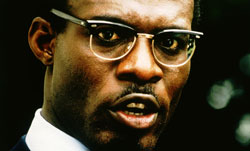The Provost Film Series screened their second movie, Lumumba, on Monday, January 28, in Pollak Theatre.
Provost and Vice President for Academic Affairs, Dr. Thomas S. Pearson hosted the event. The 2012-2013 Provost Film Series focuses on the theme of African Journeys: Haunting Legacies, Fragile Futures.
Lumumba tells the story of Patrice Lumumba, an ambitious leader whose powerful words were a threat to those who opposed his vision of an independent Congo from Belgium in 1960. It’s a tragic yet inspiring historical film surrounding one visionary man and country that received its independence 50 years too soon.
“I think tonight’s film could not be more timely,” Pearson said as he introduced the movie. He discussed the plot of the film along with topics of racism and colonial independence in today’s world.
Lumumba was packed with oppressive violence and an inspiring story told in a non-linear structure. Economic, social and cultural issues within the territories of the Congo were brought to light and the film touched on the themes of love and devastation.
Professor Julius Adekunle, history professor, spoke at the end of the movie and opened up a question and answer discussion with members of the audience. He went on to explain the historical facts behind Lumumba and why his ideals didn’t coincide with his time. “Lumumba himself did not have political experience,” said Adekunle.
Although Lumumba may have been college educated and spoke with motivational power, his lack of political experience was one of the factors that led to his demise.
Lumumba starred Eriq Ebouaney as Lumumba and was directed by Raoul Peck. It was originally released in 2000. The film ran for 115 minutes with not a minute wasted.
Ebouaney had a commanding presence on screen and displayed all the personal sides of Lumumba: The determined leader, the unwavering humanitarian, the loving father and the humility of a man with a dream.
Senior Daniel Taylor, history and education major, said, “It represented a good refined version of this historical event. It did jump around a lot, but the director told a fluent story. Overall, I liked it.”
Taylor attended the film for extra credit. He said he would attend more Provost films in the series if they were similar to Lumumba.
Pearson said, “I think the films are very educational, students who go will have an appreciation for another part of the world.” He went on to explain that as a professor, he always used film as an educational vehicle. Pearson picked Africa for the theme of the Provost Film Series because “We’re really trying to emphasize cultural diversity.” This marks the sixth Provost Film Series.
The audience for Lumumba was sprinkled with students, faculty and a few other individuals outside of the University.
Pearson explained they’ve been having bad luck weather-wise on the nights of their films this year. The highest attendance at a Provost film was around 130 people.
The next film in the Provost Film Series is Munyurangabo on March 23. Munyurangabo revolves around a boy who seeks justice for his parents who were killed in the Rwandan genocide.
All films are free of charge and open to the public. Lumumba is a biographical drama that had audiences in Pollak cheering, cringing and engaged. It was a film that served an educational purpose but didn’t feel like a dragged out history lecture. Dr. Thomas S. Pearson said, “You can be a citizen of the world partly by being a citizen of world cinema.”



